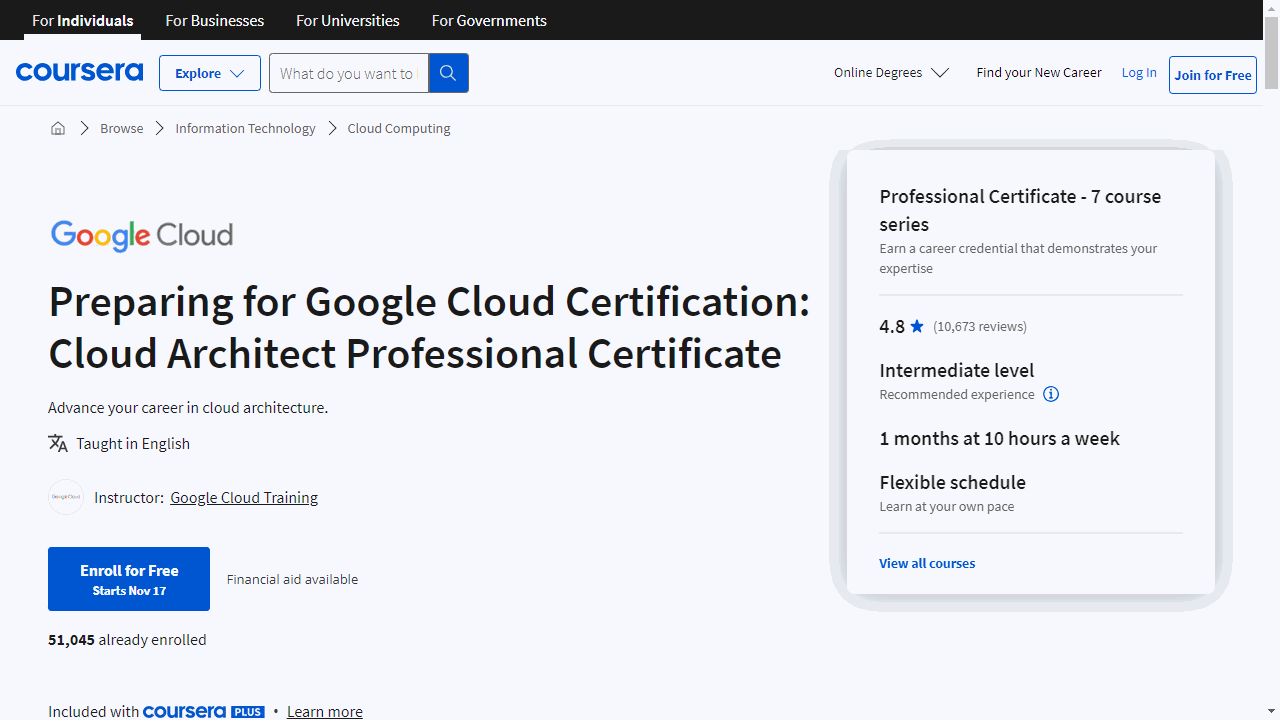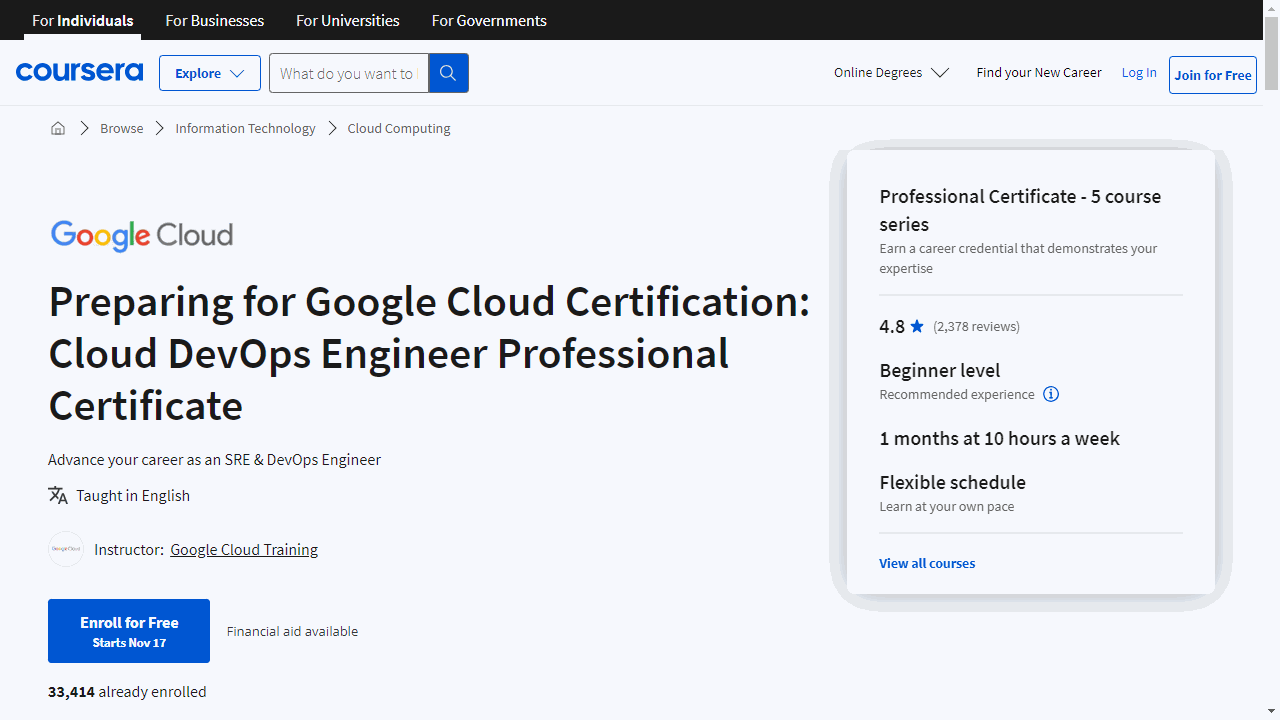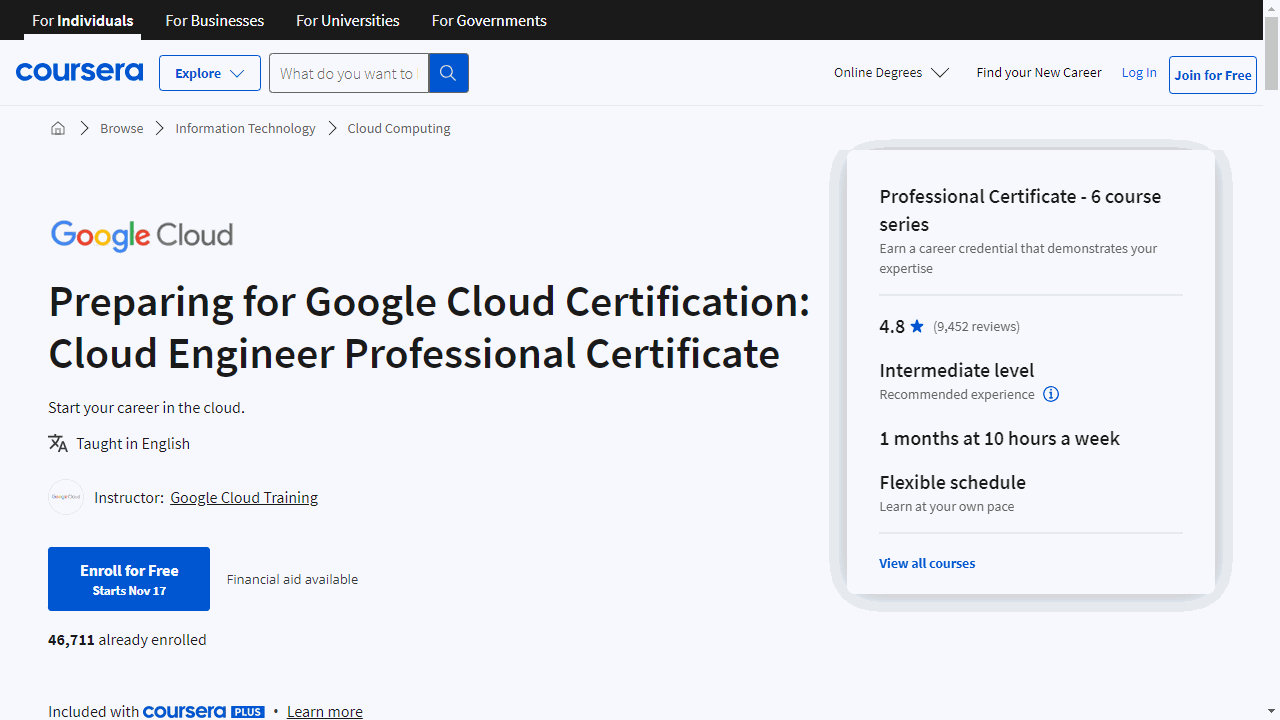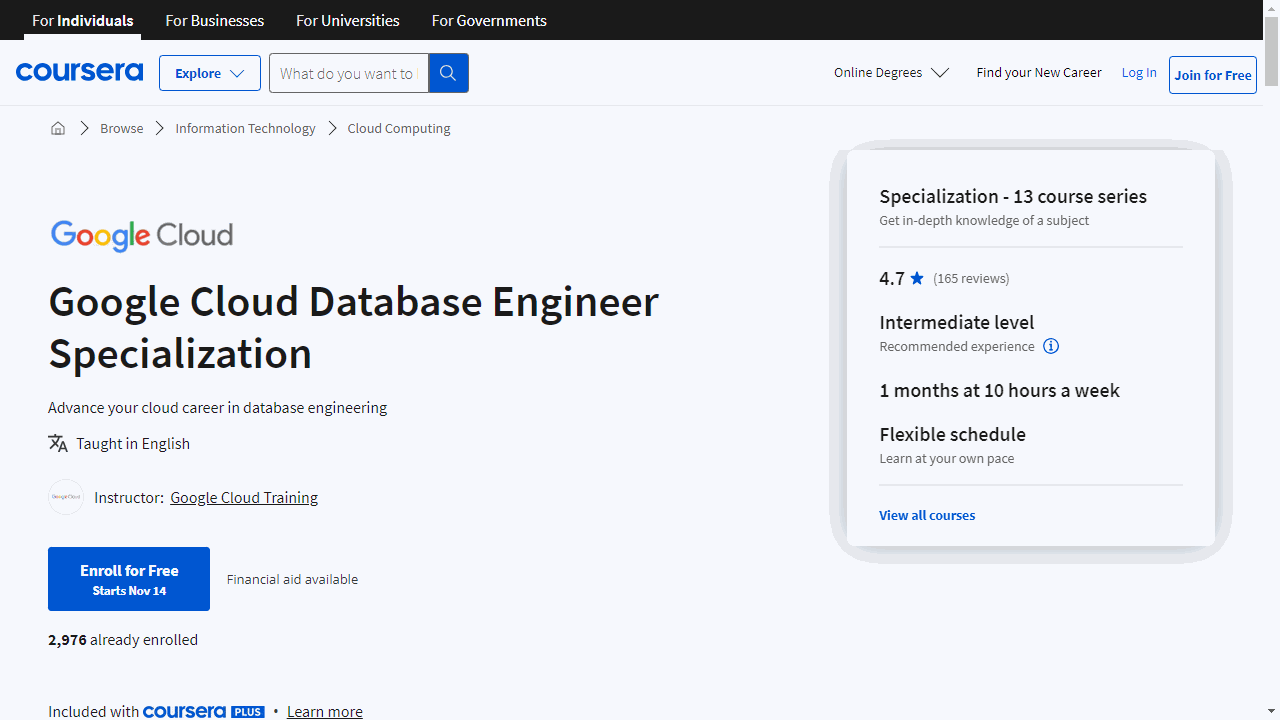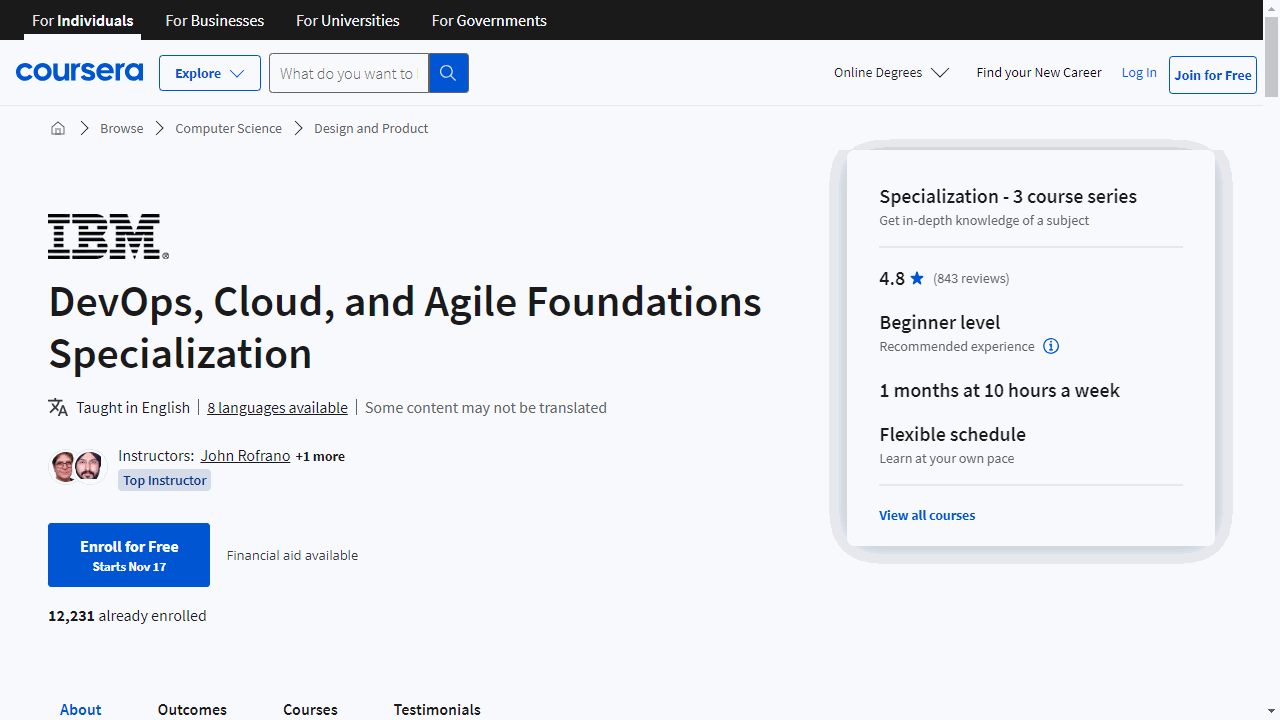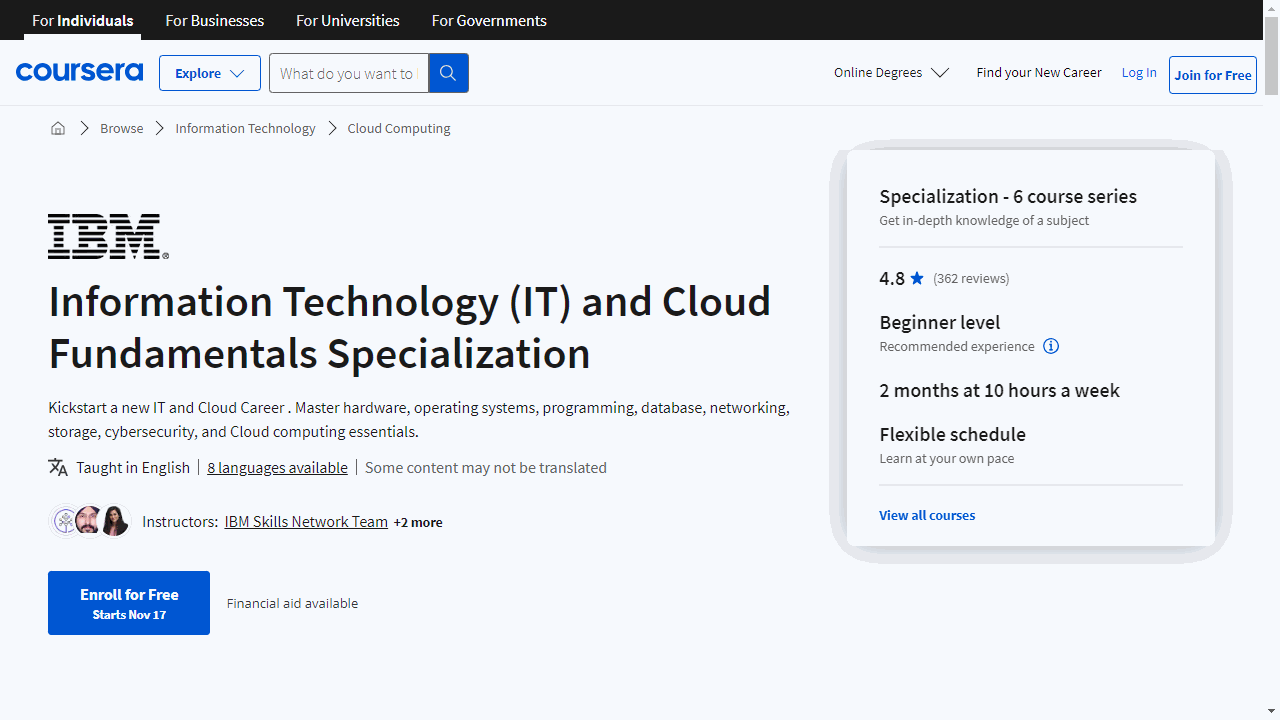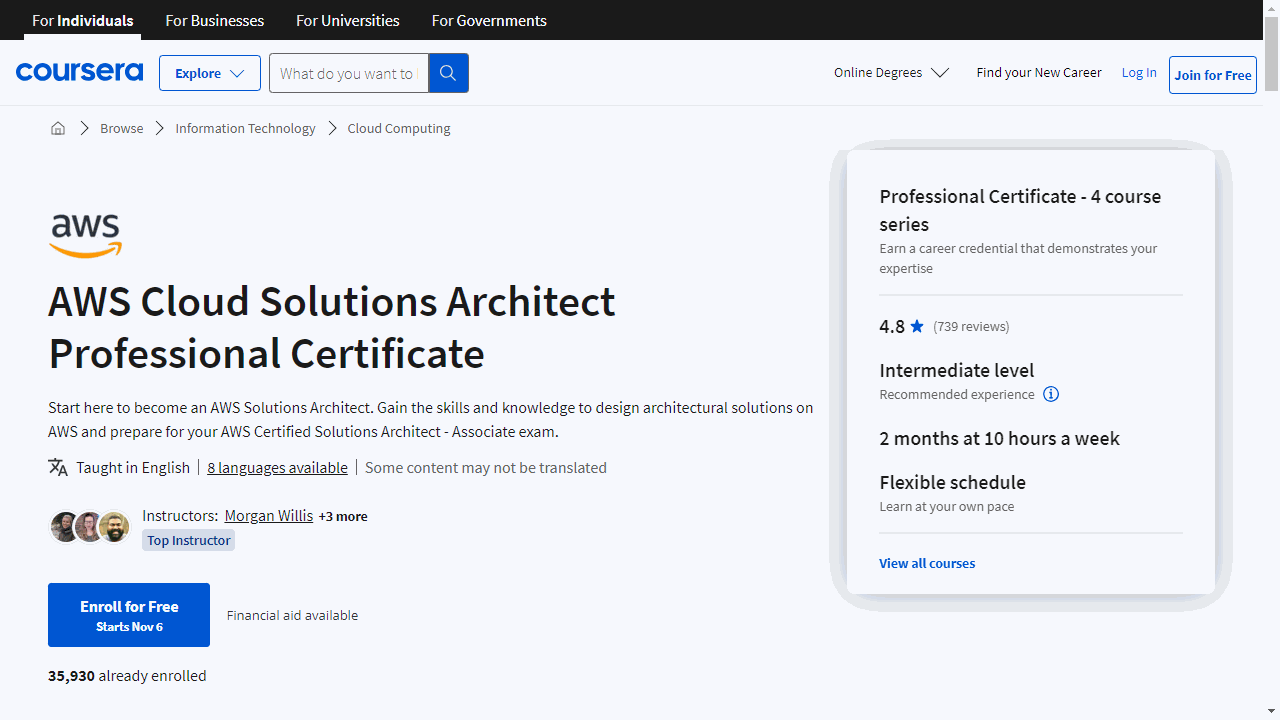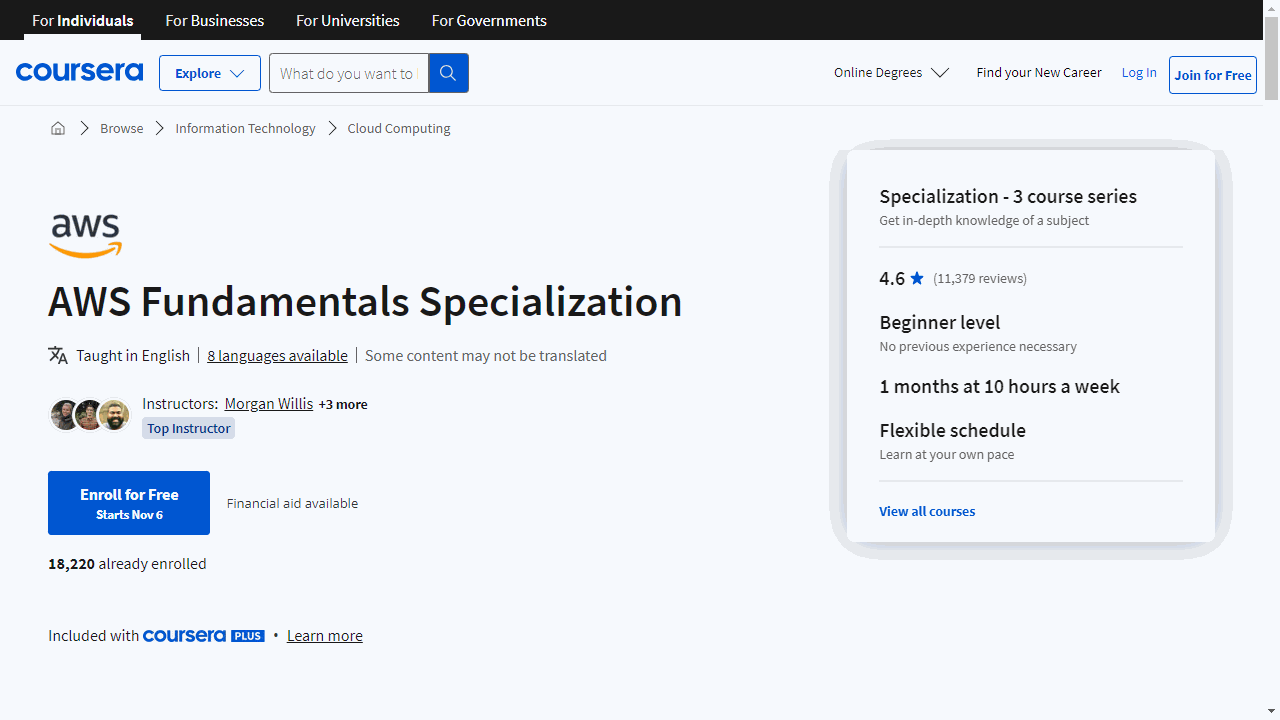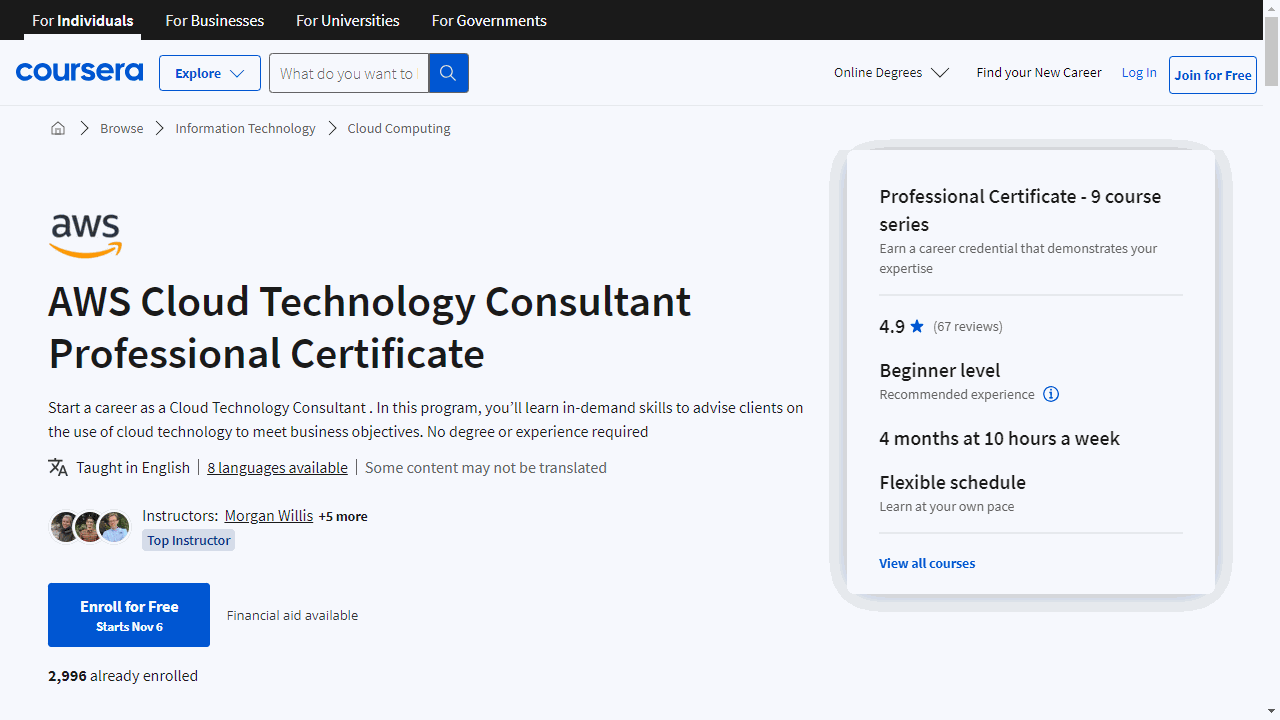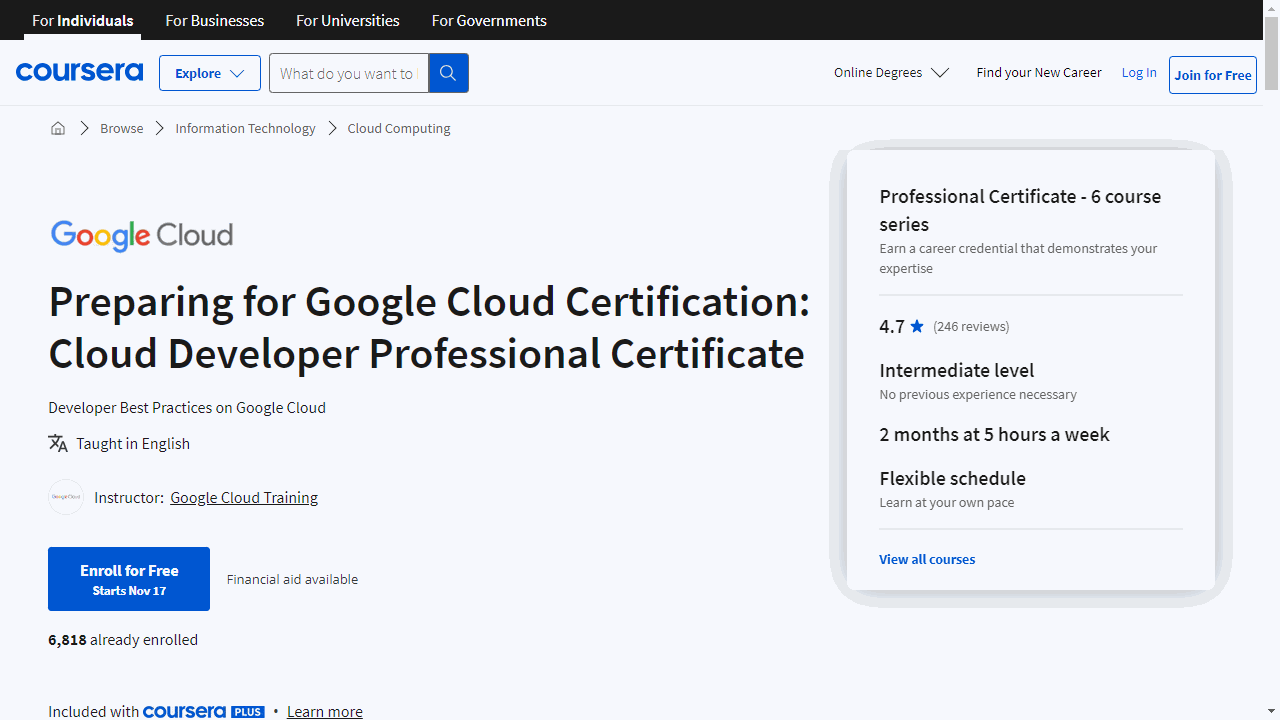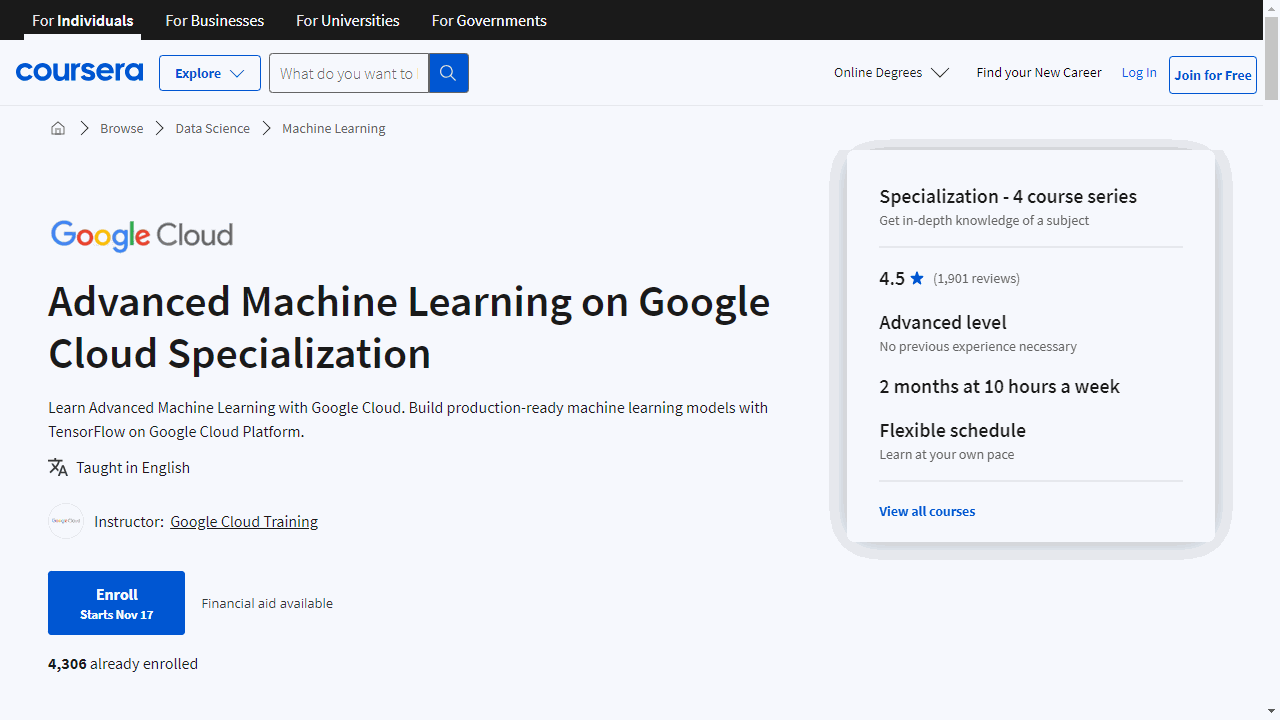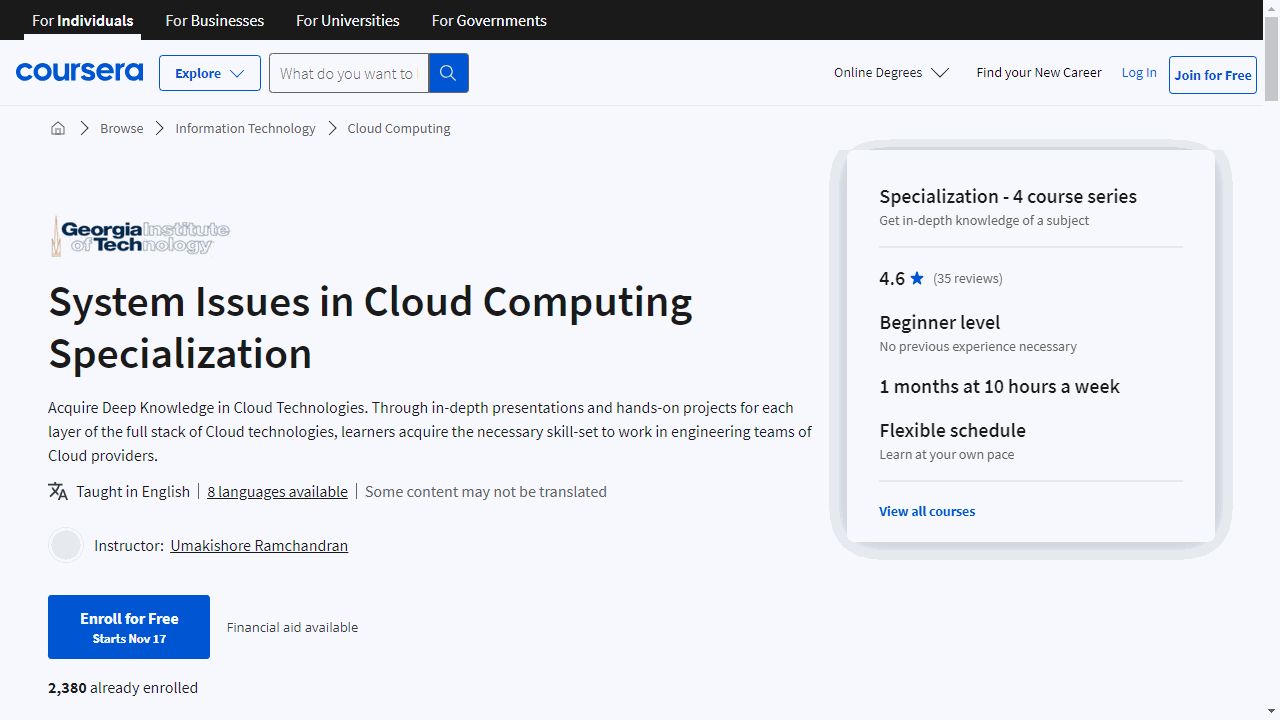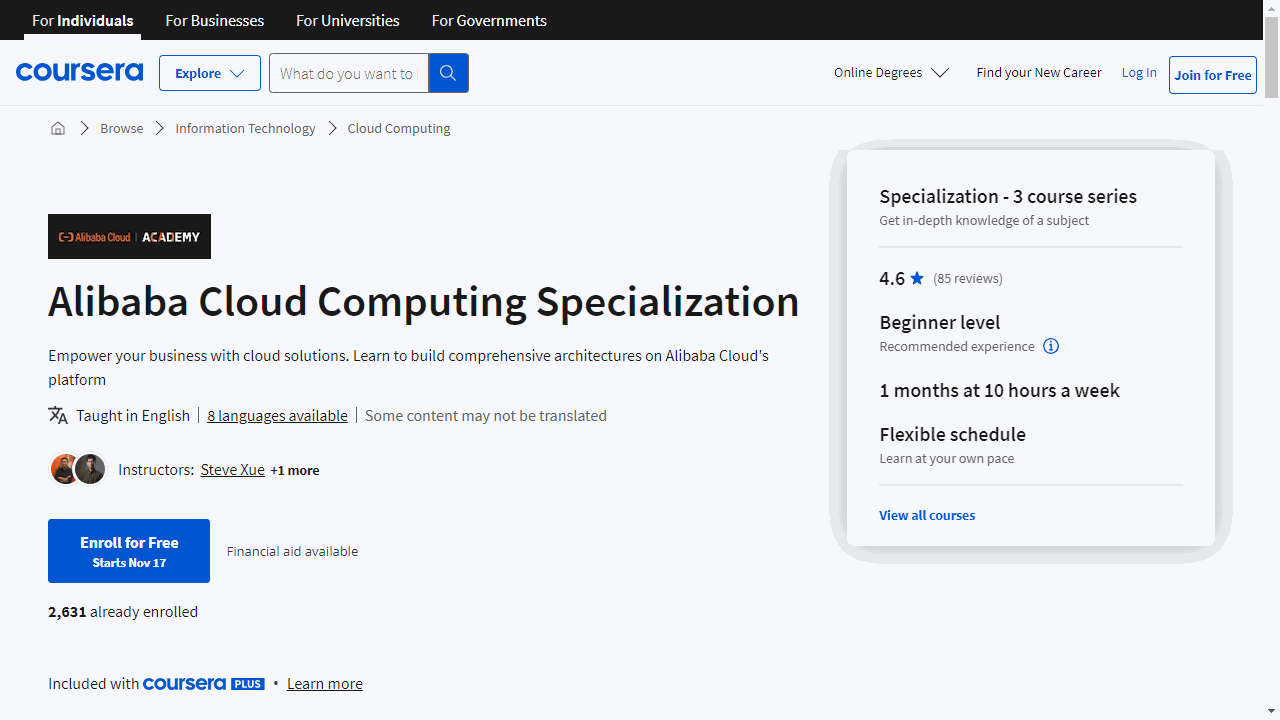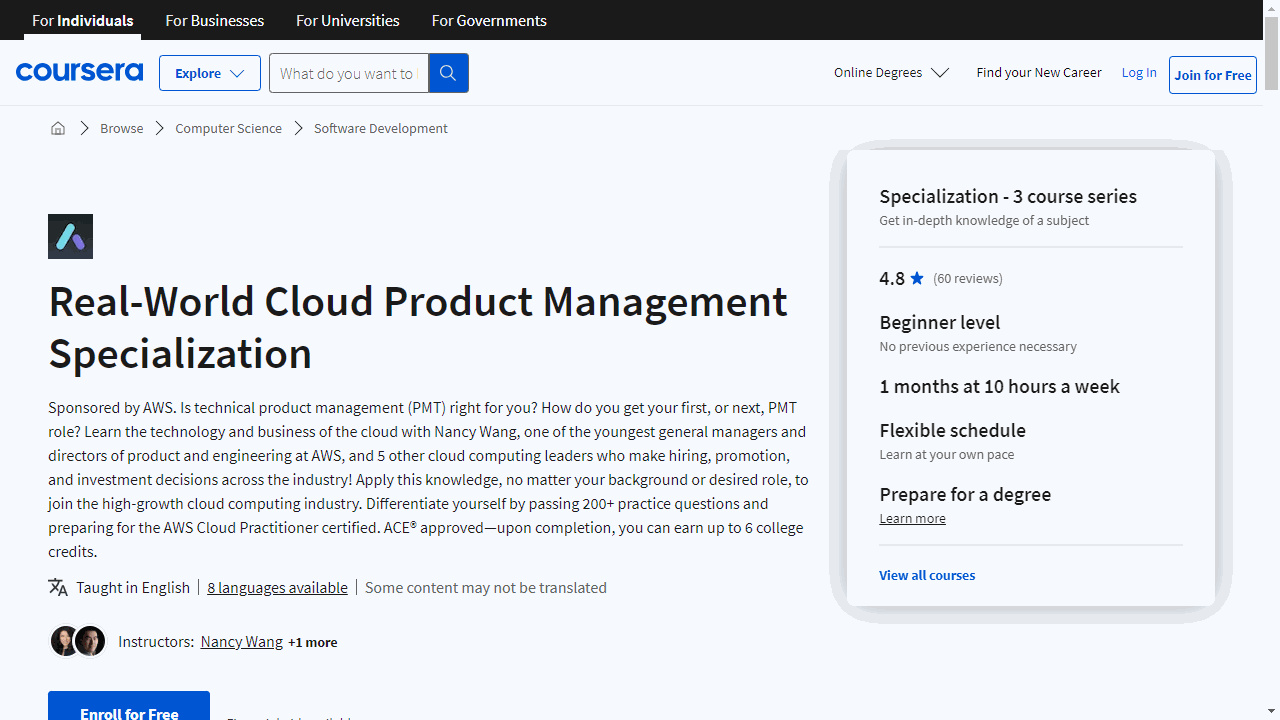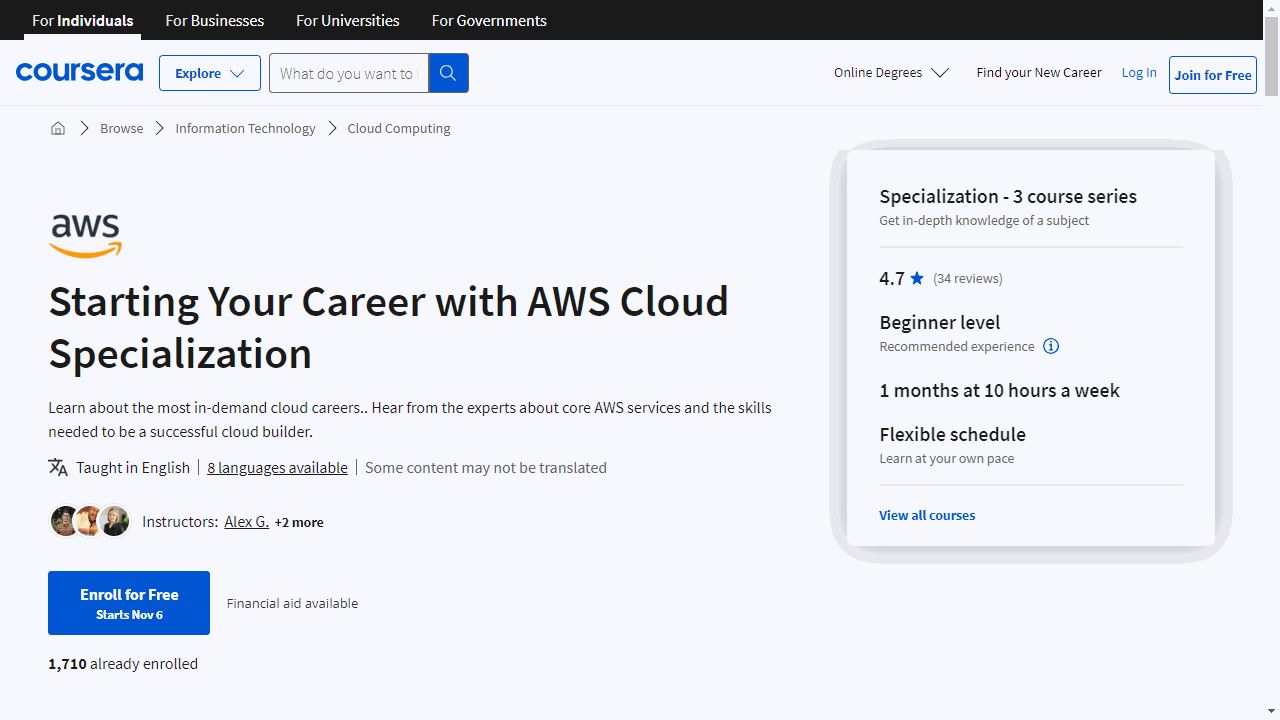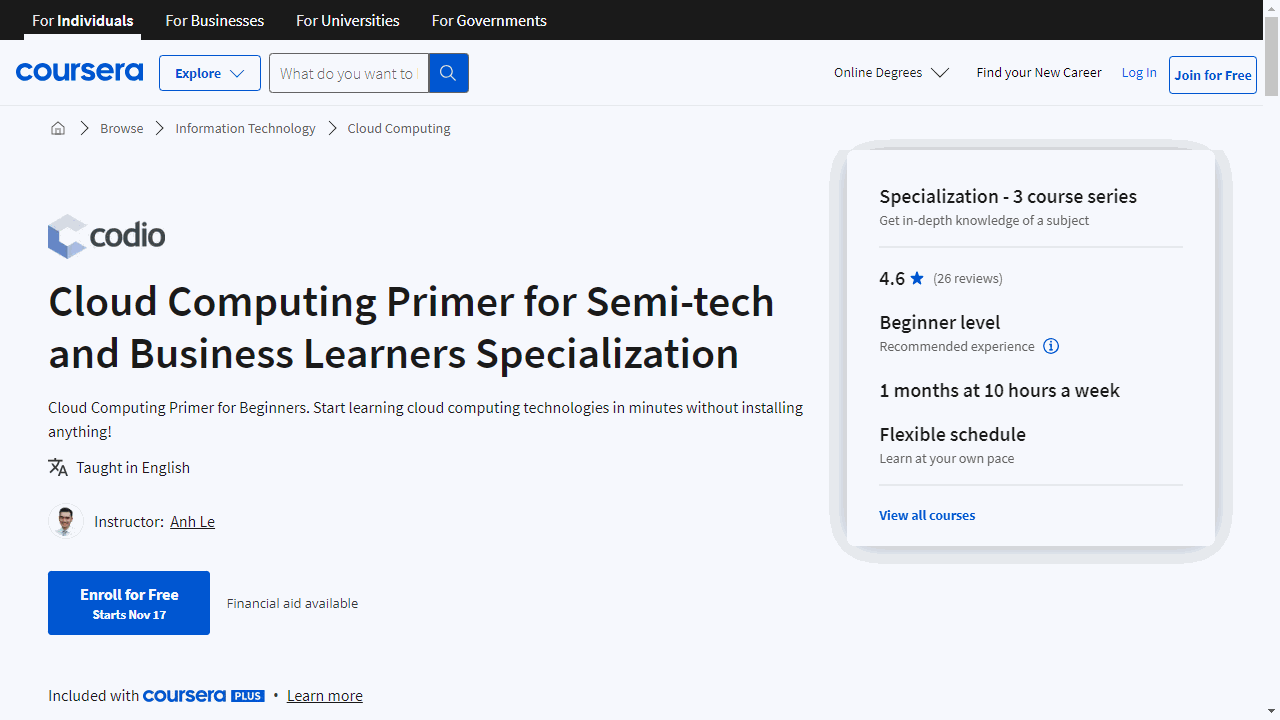Cloud computing is revolutionizing the way we access and manage data, applications, and resources.
It offers unparalleled flexibility, scalability, and cost-effectiveness, making it a cornerstone of modern technology.
By learning cloud computing, you can gain in-demand skills that are applicable to a wide range of industries and roles, from software development to data analysis.
Finding the right cloud computing course on Coursera can be a daunting task, with so many options available.
You’re looking for a program that’s comprehensive, engaging, and taught by experts, but also fits your learning style and goals.
For the best cloud computing course overall on Coursera, we recommend the Google Cloud Architect Professional Certificate.
This program is a comprehensive seven-course journey that equips you with the skills needed to design, build, and manage cloud solutions on Google Cloud Platform (GCP).
It covers key GCP services, including Compute Engine, Cloud Storage, Kubernetes, and more.
This program is taught by Google employees who work in cloud architecture, providing real-world examples and hands-on activities.
While this is our top pick, there are other great options available.
Keep reading for more recommendations for beginners, intermediate learners, and experts, as well as courses focusing on specific cloud providers like AWS, Azure, and Alibaba Cloud.
Google Cloud Architect Professional Certificate
This series of courses is designed to equip you with the knowledge and skills necessary to excel as a cloud architect within the Google Cloud ecosystem.
The journey begins with “Google Cloud Fundamentals: Core Infrastructure,” where you’ll familiarize yourself with the essentials of GCP.
This course lays the groundwork, introducing you to the platform’s computing and storage services, and teaching you how to manage resources effectively.
It’s a practical first step, ensuring you understand the basics before moving on to more complex topics.
As you progress to “Essential Google Cloud Infrastructure: Foundation,” you’ll delve into the infrastructure services provided by GCP, focusing on Compute Engine.
This course is where you start to build, exploring the Google Cloud console and Cloud Shell, and learning how to create virtual networks and firewalls.
It’s hands-on, giving you the chance to apply what you’ve learned in real-world scenarios.
Building on that foundation, “Essential Google Cloud Infrastructure: Core Services” introduces you to key deployment solutions and security practices.
You’ll learn how to manage data storage services and monitor the billing of GCP resources, which is crucial for keeping costs in check.
For those interested in scalability and automation, “Elastic Google Cloud Infrastructure: Scaling and Automation” offers valuable insights.
This course teaches you how to connect infrastructure, configure load balancers, and automate deployments.
It’s about making your infrastructure adaptable and efficient, a skill set that’s highly sought after in the industry.
The “Reliable Google Cloud Infrastructure: Design and Process” course is where your design skills come into play.
You’ll learn to create solutions that are not only reliable and available but also secure and cost-effective.
This course challenges you to think critically about infrastructure design, preparing you to make informed decisions in a professional setting.
For enthusiasts of containerization and orchestration, “Architecting with Google Kubernetes Engine: Foundations” is an excellent introduction to the power of Kubernetes.
This course will help you understand container management and the architecture of Kubernetes, an essential skill for modern cloud computing.
Lastly, “Preparing for your Professional Cloud Architect Journey” is the capstone course that helps you prepare for the PCA certification exam.
It’s a strategic guide to assess your readiness and develop a personalized study plan, ensuring you’re well-prepared for the certification process.
By the end of the program, you’ll have a robust understanding of GCP and be well on your way to becoming a proficient cloud architect.
Google Cloud DevOps Engineer Professional Certificate
This series of courses is designed to build a strong foundation in Google Cloud, and it’s structured to guide you through the complexities of cloud infrastructure and operations.
Starting with “Google Cloud Fundamentals: Core Infrastructure,” you’ll gain a clear understanding of Google Cloud’s core services.
This course isn’t just about theory; it’s interactive, with hands-on labs that allow you to apply what you learn by creating a basic infrastructure setup.
You’ll come away with the ability to discern which Google Cloud storage options best fit various scenarios.
Moving on, “Developing a Google SRE Culture” introduces you to the principles of Site Reliability Engineering (SRE), a methodology pioneered by Google to ensure that development and operations teams work harmoniously.
This course will help you understand the value of SRE and how to implement its practices to enhance collaboration and efficiency within your organization.
For those looking to design resilient cloud solutions, “Reliable Google Cloud Infrastructure: Design and Process” is invaluable.
It builds upon previous courses, focusing on designing deployments that meet stringent business and technical requirements.
You’ll learn to articulate application requirements, secure your cloud environment, and ensure your infrastructure is both reliable and cost-effective.
Monitoring and logging are critical for maintaining performance, which is where “Logging and Monitoring in Google Cloud” comes in.
This course equips you with the skills to set up comprehensive monitoring systems, create alerts, and analyze logs.
These capabilities are crucial for proactively managing cloud infrastructure and ensuring issues are addressed promptly.
Lastly, “Getting Started with Google Kubernetes Engine” demystifies Kubernetes, a key tool for modern cloud applications.
You’ll explore containerization with Google Kubernetes Engine, learning to deploy and manage containerized applications efficiently.
The course breaks down Kubernetes architecture and operations, making it accessible even if you’re new to the concept.
Each course in this professional certificate program is designed to be practical and applicable.
You’ll engage with real-world case studies and gain experience that directly translates to on-the-job scenarios.
It’s a thoughtful blend of theory and practice, leading to a well-rounded skill set in Cloud DevOps.
Google Cloud Engineer Professional Certificate
This suite of courses is designed to equip you with the skills and knowledge needed to excel in the cloud domain, particularly if you’re eyeing a Google Cloud career.
Starting with “Google Cloud Fundamentals: Core Infrastructure,” you’ll lay the groundwork for your cloud education.
This course demystifies the core concepts and terminology of Google Cloud, setting you up to understand its diverse computing and storage services.
You’ll learn how to navigate the infrastructure and control resources effectively, a fundamental skill for any cloud professional.
Progressing to “Essential Google Cloud Infrastructure: Foundation,” you’ll delve into the practical aspects of cloud infrastructure, including setting up networks and virtual machines.
The course emphasizes hands-on learning, allowing you to interact with the Google Cloud console and Cloud Shell, which are crucial tools for any cloud engineer.
Building on that foundation, “Essential Google Cloud Infrastructure: Core Services” introduces you to advanced infrastructure components.
You’ll tackle identity and access management, data storage services, and resource monitoring—key areas that ensure the security and efficiency of cloud operations.
As your skills develop, “Elastic Google Cloud Infrastructure: Scaling and Automation” teaches you how to scale and automate your cloud infrastructure.
Understanding how to connect infrastructure and configure load balancers and autoscaling is vital for managing large-scale, resilient systems.
The course “Architecting with Google Kubernetes Engine: Foundations” is where you’ll get acquainted with containerization and Kubernetes, technologies that are revolutionizing the way applications are deployed and managed.
This knowledge is not just trendy; it’s becoming essential for modern cloud engineers.
Lastly, “Preparing for Your Associate Cloud Engineer Journey” is the capstone that helps you consolidate your learning.
It’s tailored to prepare you for the Associate Cloud Engineer exam, covering the exam’s domains and providing a structured study plan.
Google Cloud Database Engineer Specialization
This specialization offers a blend of theoretical knowledge and practical skills, essential for mastering Google Cloud’s database services.
Begin with “A Tour of Google Cloud Hands-on Labs,” where you’ll get a practical introduction to the Google Cloud Platform.
This course demystifies the cloud environment, teaching you how to manage projects and understand IAM roles and permissions through direct interaction with the Cloud Console.
Building on that foundation, “Google Cloud Fundamentals: Core Infrastructure” delves into the essential concepts and services of GCP, like Bigtable, Firestore, and Kubernetes Engine.
You’ll learn to construct a basic infrastructure and explore various storage options, setting the stage for more advanced topics.
“Cloud SQL for MySQL: Qwik Start” offers a concise, hands-on approach to creating and managing a Cloud SQL MySQL instance.
It’s a straightforward course that gets straight to the point, showing you how to perform SQL operations effectively.
If you’re considering a move from Amazon RDS to Cloud SQL, the course “Migrating to Cloud SQL from Amazon RDS for MySQL Using Database Migration Service” provides a clear roadmap.
It guides you through a one-time migration, ensuring a smooth transition for your MySQL data.
Similarly, “Migrating On-premises MySQL Using a Continuous Database Migration Service Job” is tailored for those looking to shift from an on-premises setup to Cloud SQL.
This course emphasizes the importance of continuous migration, allowing for real-time data syncing.
PostgreSQL enthusiasts will appreciate courses like “Migrate to Cloud SQL for PostgreSQL using Database Migration Service” and “Connect an App to a Cloud SQL for PostgreSQL Instance.”
These courses cover the essentials of migrating databases and integrating them with applications, a critical skill for any data engineer.
Security is paramount in data management, and “Securing a Cloud SQL for PostgreSQL Instance” addresses this head-on.
You’ll learn to implement robust security measures, ensuring your databases are protected against unauthorized access.
Data recovery is another critical area covered in “Configure Replication and Enable Point-in-Time-Recovery for Cloud SQL for PostgreSQL.”
This course teaches you how to set up replication and perform point-in-time recovery, providing peace of mind by safeguarding against data loss.
For a deep dive into Google’s horizontally scalable database, “Cloud Spanner - Loading Data and Performing Backups” and “Cloud Spanner - Defining Schemas and Understanding Query Plans” offer a comprehensive look at Cloud Spanner’s capabilities, from data insertion to query optimization.
The practical application of these skills is showcased in “Deploy a Modern Web App connected to a Cloud Spanner Instance,” where you’ll build and deploy a web application that interacts with Cloud Spanner, reinforcing the real-world relevance of the skills you’ve acquired.
Lastly, “Enterprise Database Migration” is the capstone of this specialization.
It’s designed for those tasked with large-scale database migrations, covering the intricacies of moving enterprise databases like SQL Server and Oracle to Google Cloud.
IBM DevOps, Cloud, and Agile Foundations Specialization
The specialization kicks off with “Introduction to DevOps,” a course that lays the groundwork for understanding the DevOps culture.
It’s not just about the technical skills—though you’ll get plenty of those—it’s also about fostering collaboration and shared responsibility.
You’ll explore how to use cloud native architecture to enhance product resilience and delve into essential DevOps tools and practices, such as CI/CD, which streamline the development process.
Moving on to “Introduction to Cloud Computing,” this course demystifies the cloud, providing a clear explanation of its service models and deployment strategies.
You’ll gain insight into the offerings of major cloud providers and learn about the architecture that underpins cloud services.
The course culminates in a hands-on project where you’ll apply what you’ve learned by deploying an application using serverless architecture, giving you a tangible skill to showcase.
Lastly, “Introduction to Agile Development and Scrum” introduces you to the world of Agile methodologies, focusing on how to adapt to change and deliver value quickly.
You’ll understand the roles within a Scrum team and the importance of iterative planning.
By learning to write effective user stories and manage a product backlog, you’ll be equipped to enhance team efficiency and meet customer needs more effectively.
The content is presented in a straightforward manner, with a focus on real-world application, ensuring that you’re not just learning theories but also how to apply them in practice.
IBM Information Technology (IT) and Cloud Fundamentals Specialization
This series of courses is designed to build your IT and cloud computing knowledge from the ground up, with a focus on practical skills and real-world applications.
The journey begins with “Introduction to Hardware and Operating Systems,” where you’ll gain essential knowledge about computer hardware and operating systems.
This course is more than just an introduction; it’s a hands-on experience that will enable you to perform IT tasks such as setting up workstations and troubleshooting common issues.
It’s also a stepping stone towards CompTIA ITF+ and A+ certifications, which are valuable credentials in the tech industry.
Moving on, “Introduction to Software, Programming, and Databases” expands your understanding of software applications and introduces you to programming fundamentals.
You’ll explore the intricacies of software compatibility, cloud computing, and database management.
By the end of this course, you’ll have a clearer picture of how software development and cloud technologies play pivotal roles in modern business.
The “Introduction to Cloud Computing” course is specifically tailored for those looking to grasp the essentials of cloud services.
You’ll learn about various cloud service models and gain insights into the offerings of major cloud providers.
The course culminates in a project where you’ll apply your knowledge by deploying an application using serverless architecture.
Networking is a vital component of IT, and “Introduction to Networking and Storage” ensures you’re well-versed in this area.
You’ll understand network types, storage options, and how to troubleshoot network issues.
The course includes practical activities that reinforce the material, helping you to develop the skills needed to maintain and secure networks.
Cybersecurity is a critical concern, and “Introduction to Cybersecurity Essentials” addresses this by teaching you how to protect against common security threats.
You’ll learn about safe browsing practices, password management, and encryption, among other security measures.
This course is particularly beneficial if you’re considering a career in cybersecurity or any IT role that requires a strong understanding of security best practices.
Finally, the “Practice Exam for CompTIA ITF+ Certification” is an excellent resource to assess your readiness for the CompTIA ITF+ exam.
It provides a realistic practice environment, helping you to identify areas where you may need further study.
The courses are structured to be accessible to beginners, yet they provide depth in key areas that are relevant to the industry.
By completing this series, you’ll be equipped with the knowledge and skills to pursue various IT roles, with a particular emphasis on cloud computing.
AWS Cloud Solutions Architect Professional Certificate
Starting with “AWS Cloud Technical Essentials”, you’ll get an introduction to key services like EC2, S3, and DynamoDB.
You’ll learn cloud security basics and how to monitor infrastructure.
Next is “Architecting Solutions on AWS”.
This course has you work through real-life customer scenarios to practice identifying AWS services to build secure, resilient systems.
You’ll gain skills in event-driven and hybrid architectures optimized for efficiency.
After that, “Introduction to Designing Data Lakes on AWS” teaches you to build a secure, scalable data lake.
You’ll understand common components and get hands-on practice ingesting and processing data at scale.
Finally, “Exam Prep for the AWS Certified Solutions Architect - Associate” helps you assess readiness for the exam.
You’ll review sample questions and practice skills to identify weak areas before the test.
Overall, these courses offer robust preparation for a career as an AWS solutions architect.
The practical focus gives you in-demand technical skills for designing and implementing cloud systems on AWS.
And the professional certificate can validate your abilities to potential employers.
AWS Fundamentals Specialization
Looking to launch your cloud computing career?
This Specialization from Coursera is the perfect starting point.
You’ll get hands-on with the most essential AWS services through real-world scenarios.
The first course introduces you to core AWS offerings.
You’ll learn key concepts like IAM, EC2, S3, and more. By the end, you’ll be able to choose the right AWS services for different needs.
The material focuses on building highly available, scalable, and cost-effective applications.
Next, you’ll dive into migration planning. Discover how to assess, mobilize, and migrate to the AWS cloud smoothly.
You’ll explore the tools and features that facilitate migrations at any scale.
With this knowledge, you can design and execute migrations confidently.
The third course is all about architecting robust solutions on AWS.
You’ll work through use cases to identify optimal services and features.
By the end, you’ll know how to build resilient, secure, and highly available systems.
Together, these courses provide end-to-end training for AWS beginners.
AWS Cloud Technology Consultant Professional Certificate
This comprehensive program includes 9 courses designed to teach you everything you need to know to become an AWS cloud consultant.
The courses provide a solid foundation in AWS and cloud basics before diving into technical skills like Python programming, automation, databases, and more.
For example, the “Introduction to Information Technology and AWS Cloud” course covers computing fundamentals, cloud security, and careers.
“AWS Cloud Technical Essentials” then builds your cloud knowledge with a hands-on look at core services like EC2, S3, and Lambda.
Crucially, the certificate also develops the soft skills needed for consulting, like communication, requirements gathering, and relationship building.
The “Skills for Working as an AWS Cloud Consultant” course focuses entirely on mastering these abilities.
The certificate culminates with a Capstone project where you put your new skills into practice following the AWS Well-Architected Framework.
This ensures you can make informed decisions about architecture design and mitigate risks.
With engaging video lectures, knowledge checks, and hands-on labs, these courses deliver the perfect blend of theory and practical experience.
The skills you gain will make you a highly qualified cloud consultant.
Businesses are rapidly migrating to the cloud. With this certificate on your resume, you’ll be ready to guide them through that transition and thrive in your career.
Google Cloud Developer Professional Certificate
Starting with “Google Cloud Fundamentals: Core Infrastructure,” you’ll gain a clear understanding of Google Cloud’s core services.
This course lays the groundwork, teaching you to navigate the platform, manage resources effectively, and make informed decisions about infrastructure and storage solutions.
It’s a practical first step that demystifies the cloud’s complex landscape.
Moving on to “Getting Started with Google Kubernetes Engine,” you’ll delve into the world of Kubernetes, a pivotal tool for modern application deployment.
This course simplifies Kubernetes, showing you how to manage containerized applications using Google Kubernetes Engine.
You’ll come away with the ability to orchestrate your apps efficiently, a skill highly valued in today’s cloud-centric job market.
With “Getting Started With Application Development,” the focus shifts to building cloud-native applications.
Regardless of your preferred programming language, this course offers hands-on labs that reinforce best practices for application development, including choosing the right data storage options.
It’s a practical approach to understanding how to leverage Google Cloud’s storage services effectively.
Security and integration are crucial, and “Securing and Integrating Components of your Application” addresses these needs.
You’ll explore how to enhance your applications with machine learning APIs, implement serverless functions, and manage user identities.
The course also introduces you to messaging and API gateways, essential for creating scalable, loosely coupled architectures.
In “App Deployment, Debugging, and Performance,” the curriculum guides you through the deployment process.
You’ll learn to automate deployments and manage infrastructure as code, which is crucial for creating repeatable and reliable application rollouts.
Additionally, the course covers debugging and performance monitoring, teaching you to troubleshoot and optimize your applications effectively.
Lastly, “Application Development with Cloud Run” introduces you to Cloud Run, a service that simplifies deploying and scaling containerized apps.
This course is particularly valuable for learning how to build flexible, scalable applications that respond to changing demand, a key advantage in the cloud.
When you finish, you’ll have a portfolio of practical skills and the confidence to tackle the Google Cloud Developer Certification exam.
Advanced Machine Learning on Google Cloud Specialization
Exploring cloud computing courses can be overwhelming, but if you’re specifically interested in machine learning, the “Advanced Machine Learning on Google Cloud Specialization” is for you.
The specialization kicks off with “Production Machine Learning Systems,” where you’ll delve into the intricacies of ML systems in production.
Understanding the difference between static and dynamic training and inference is essential, as it affects how models adapt and learn from data.
You’ll also tackle the challenges of model dependencies and learn how to manage distributed training, which is vital for creating fault-tolerant and efficient ML systems.
The ability to export models is a practical skill that ensures your work can be utilized across various platforms.
Moving on to “Computer Vision Fundamentals with Google Cloud,” you’ll gain insight into the transformative field of computer vision.
This course covers a spectrum of machine learning strategies, from leveraging pre-built ML models to developing custom classifiers with TensorFlow.
It emphasizes the importance of model accuracy, introducing you to techniques such as data augmentation and hyperparameter tuning to refine your models.
The hands-on labs provide a valuable opportunity to apply these concepts to real datasets.
For those interested in the intersection of machine learning and linguistics, “Natural Language Processing on Google Cloud” offers a deep dive into NLP.
This course guides you through Google Cloud’s NLP products and solutions, equipping you with the skills to create end-to-end NLP workflows using Vertex AI.
You’ll build various NLP models and explore advanced concepts like transformers and BERT.
Prior knowledge of SQL, Python, and TensorFlow is recommended to fully benefit from this course.
Lastly, “Recommendation Systems on Google Cloud” teaches you how to construct ML pipelines that power recommendation engines.
You’ll learn to develop content-based and collaborative filtering engines, as well as hybrid systems that combine user and content data.
The course also introduces reinforcement learning for recommendations, a technique that can dynamically adjust to user preferences.
With a focus on Google Cloud and TensorFlow, you’ll emerge with skills that are highly relevant to current industry needs.
This specialization is a solid choice for anyone looking to deepen their expertise in machine learning within the cloud computing space.
System Issues in Cloud Computing Specialization
The specialization begins with “Software Defined Networking,” where you’ll explore the evolution and fundamentals of data center networking.
This course doesn’t just skim the surface; it takes you through the intricacies of network architectures like Microsoft VL2 and the principles of traffic engineering.
It’s a comprehensive introduction that sets the stage for what’s to come.
Moving on to “Cloud Systems Software,” you’ll delve into the technicalities of cloud programming frameworks.
This course covers essential topics such as scalable distributed data stores and resource management, crucial for maintaining multi-tenancy and elasticity in the cloud.
For those interested in hands-on experience, there’s an opportunity to implement a basic distributed runtime system, providing a practical edge to your learning.
“Cloud Applications” shifts the focus to the practical aspects of cloud technology.
Here, you’ll learn about developing cloud-native applications, migrating existing applications to the cloud, and understanding the core components that cloud applications rely on.
The course also touches on innovative cloud applications, broadening your perspective on what’s possible in the cloud space.
Lastly, “Network Function Virtualization” offers a systems engineer’s view on virtualizing network functions.
You’ll examine the need for virtualization in enterprise networks and discover optimizations for efficient networking on virtualized hardware.
The course ties together SDN and NFV, illustrating their combined role in enhancing data center networking services.
You’ll gain practical skills that are directly applicable to the industry, preparing you for a career in cloud computing.
This specialization follows a practical, detailed, and methodical approach to learning that respects your time and intelligence.
Alibaba Cloud Computing Specialization
If you are specifically interested in Alibaba Cloud, the “Alibaba Cloud Computing Specialization” is a great place to start.
Starting with “Cloud Computing Fundamentals on Alibaba Cloud,” you’ll receive a well-rounded introduction to cloud services.
This course isn’t just about theory; it’s about application.
You’ll explore Alibaba Cloud’s essential products, such as ECS for computing and OSS for storage, and learn how to architect scalable cloud solutions.
The focus on enterprise best practices means you’ll be equipped to handle real business challenges.
Moving on to “Big Data Analytical Platform on Alibaba Cloud,” you’ll tackle the complexities of Big Data.
This course demystifies the process of collecting, analyzing, and visualizing large datasets.
With an emphasis on Alibaba Cloud’s Big Data products, you’ll gain the skills to extract meaningful insights from data, a highly sought-after ability in today’s data-driven world.
The final course, “Protecting Cloud Architecture with Alibaba Cloud,” addresses the critical aspect of security.
It’s a comprehensive guide to safeguarding your cloud infrastructure, covering everything from operating systems to network defenses.
This course prepares you for Alibaba Cloud’s security certification, reflecting a deep commitment to creating a secure cloud environment.
Each course is designed to build upon the last, culminating in a set of skills that are not only marketable but essential for the modern IT professional.
The path to certification is clear, with additional resources provided to ensure you have the opportunity to validate your expertise.
Real-World Cloud Product Management Specialization
In the first course, you’ll get an overview of the booming cloud industry.
Learn how the cloud accelerates business and careers. Compare cloud vs non-cloud architectures. And determine if the AWS Certified Cloud Practitioner Exam fits your goals.
The second course dives into managing and innovating in the cloud.
Master compute, containers, serverless, databases, analytics, machine learning, and more. Plus, learn cloud pricing and cost optimization from the product manager perspective.
Finally, the third course focuses on security and architecture.
Understand the Shared Responsibility Model. Follow the AWS Well-Architected Framework. And get ready to pass the AWS Cloud Practitioner Exam.
Starting Your Career with AWS Cloud Specialization
The first course provides an excellent introduction to cloud computing roles and terminologies.
You’ll learn key differences between infrastructure, platform, and software services so you can better understand the AWS ecosystem.
Interviews with Amazon employees give invaluable insight into day-to-day responsibilities of positions like Solutions Architect, Data Scientist, and Security Engineer.
This context will help you determine if a career in the cloud is right for you.
The second course delivers a comprehensive overview of AWS services related to computing, networking, storage, databases, analytics, monitoring, cost optimization and security.
You’ll be able to differentiate between the core AWS offerings and identify how they can be applied based on your specific role.
This foundational knowledge is essential for new cloud practitioners.
The third course is where you get hands-on with AWS through video demonstrations and exercises.
You’ll learn how to create an account, leverage the Free Tier, and see AWS services combine to build real-world solutions.
Example scenarios showcase how the cloud can facilitate data analytics, architecture, and operations.
Following along will help cement your understanding and prepare you for real-world cloud work.
Cloud Computing Primer for Semi-tech and Business Learners Specialization
This specialization has a practical approach and clear focus on the three core service models of cloud computing: SaaS, PaaS, and IaaS.
The first course, “Cloud Computing Primer: Software as a Service (SaaS),” demystifies the concept of accessing applications over the internet.
You’ll discover the advantages and challenges of cloud computing, strategies for leveraging SaaS for business growth, and you’ll get to explore a SaaS model through a hands-on demo.
This course emphasizes active learning, allowing you to grasp the material through interactive exercises rather than passive video lectures.
Moving on to “Cloud Computing Primer: Platform as a Service (PaaS),” you’ll delve into the world of cloud platforms, which provide a suite of tools for developers to create applications.
The course helps you differentiate between various PaaS offerings and introduces you to both public and private PaaS environments through a simulated experience.
This practical engagement ensures you understand the nuances of PaaS without needing a background in development.
Lastly, “Cloud Computing Primer: Infrastructure as a Service (IaaS)” covers the foundational elements of cloud infrastructure.
You’ll learn about selecting virtual machines and the financial models associated with cloud services.
The course includes a mock IaaS experience, reinforcing the concepts by allowing you to interact with a virtual cloud environment.
Each course in the specialization is designed to be interactive and self-paced, with a variety of assessment items that provide immediate feedback.
After you finish the specialization, you’ll have a clear understanding of cloud computing’s key components and how they can be applied in a business context.
Also check our posts on:
